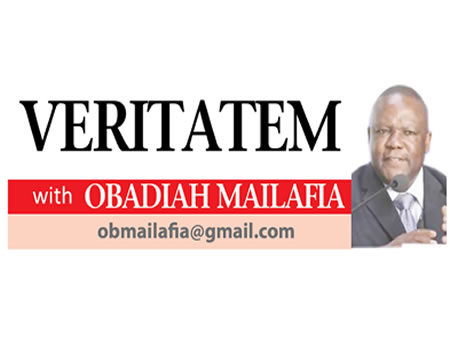It can take years to build an architectural masterpiece, but only hours to destroy it. The same can be said of democracy. It takes decades – even centuries – to build the temple of liberty, but you only need a moment of madness to bring the whole house crashing down. Democracy has been described by the British political philosopher, Michael Oakeshott, as a part of “the great conversation of mankind.”
War-time British Prime Minister, Winston Churchill, described it as “the worst system of government – except for the others.”
Two political scientists from Harvard’s reverred Department of Government, Steven Levistky and Daniel Ziblatt, have written a splendid book, ‘How Democracies Die’ (Penguin 2019). Everyone who cares about our democratic future ought to read it. The key message is that 21st democracies are in mortal danger. The rise of populism in Europe and the emergence of Donald Trump in the United States spell trouble for democracy as we have known it in the liberal West. The authors draw insightful lessons from across history – from Pinochet in Chile to Hugo Chavez in Venezuela and Erdogan in Turkey to paint a grim tapestry of how democracies are killed by bad leaders.
In the 20th century, fascism and Nazism were led by populist leaders that used the democratic process to climb up the greasy pole of power, after which they kicked away the ladder. This is how Benito Mussolini and the Black Shirts did it in pre-war Italy. It was the same moving spirit that led Adolf Hitler to use his evil charisma to attain the summits of power. In the case of Germany, the pre-war Weimar Constitution, according to historian, Golo Mann, was one of the best constitutional documents in the annals of civil government. But constitutional writs in themselves do not protect against political decay. In January 1933, Adolf Hitler and the national socialists won elections through a democratic process. Before long, they would set about dismantling all democratic institutions by propaganda and subversion; muzzling the press and bullying opponents; creating a culture of silence that brooks no dissent.
The myth of the Fuhrer became the dominant ideology that was to lead eventually to fascist totalitarianism. One of the first people who saw through the entire evil scheme was a young theologian barely in his 20s by the name of Dietrich Bonhoeffer. In a radio broadcast in Berlin, the young Bonhoeffer denounced the Nazi Fuhrerprinzip as a godless ideology that could only end in idolatry and tyranny. Before he could finish his broadcast his voice was cut off. In April 1945, Bonhoeffer was among those executed by the Nazis for plotting to remove Adolf Hitler.
The book reveals that democracy is normally killed by authoritarian leaders who come into power through democratic means and work up the people to a crescendo of frenzy through their charisma and populist rhetoric. Such people always claim to be righteous, but are, in reality, evil murderers.
The late Hugo Chavez, for example, was a young officer from the lower, middle classes of oil-rich Venezuela who once staged a coup that failed in February 1992. He was incarcerated awaiting execution when his populist tongue-lashing against the ruling oligarchs drew the mobs to his side: “It is difficult to ask the people to sacrifice themselves for freedom and democracy when they think that freedom and democracy are incapable of giving them food to eat, of preventing the astronomical rise in the cost of subsistence, or of placing a definitive end to the terrible scourge of corruption, that in the eyes of the entire world, is eating away at the institutions of Venezuela each passing day.”
Authoritarian leaders always promise to do away with corruption. The fight against “kwarraption” is often the alibi they use to justify destroying the judicature, undermining human rights and subverting the rule of law.
The greatest danger faced by democracy in our time, the authors reveal, is not only the rise of political Islam and Salafi fascism, it is also the rise of authoritarian leaders who camouflage their wickedness in a frightful grammar of ascent – anti-corruption, welfarism and nationalism.
Levitsy and Ziblatt also point to the erosion of what they term “the guardrails of democracy”, such as the Electoral College in the United States which was put in place by the founding fathers of the American Republic to guide against the emergence of populist leaders. The authors show that these “guardrails” have failed; as exemplified by the emergence of Donald Trump, a xenophobe who has retreated from the multilateralism that made the United States the leader of the free world from Woodrow Wilson to John Fitzgerald Kennedy and Barrack Obama. They also point to certain features which pencil down Trump as an authoritarian figure whose reign promises to undermine the enduring civic virtues of American democracy: weak commitment to democratic rules of the game; denial of the political legitimacy of political opponents (“crooked Hillary”); toleration or encouragement of violence; and readiness to curtail liberties of opponents, including the media (his blackballing of CNN, for example).
In fragile developing polities such as ours, it is not too difficult to kill a democracy. During the First Republic, the factors that contributed to the collapse of democracy were the unwieldy federal structure in which the northern region dominated the “tripod”, thereby undermining the first rule of federalism, i.e. that no one region should be as powerful as to overwhelm the others. Secondly, the violence and insecurity in the West that was partly encouraged by the central government. There was also the fact of nepotism, particularly within the army, where certain people were favoured over and against others, while merit was thrown to the dogs.
There was also the original sin of corruption which has continued to dog our republic, then as now. The imprisonment of Chief Obafemi Awolowo under trumped up charges was another factor, in addition to widespread rumours about a coming “genocide” against the Middle Belt and the Southerners. One of the ring leaders of the January 1966 coup recently revealed that Major Chukwuma Nzeogwu and Emmanuel Ifeajuna, and the other dramatis personae of the January 1966 putsch were on a pre-emptive strike because they believed they were about to be killed on a genocidal massacre to pave the way for a theocratic constitution spearheaded by Sir Ahmadu Bello, Premier of the then Northern Region.
In 1983, very much the same process virtually repeated itself. Shehu Shagari was a weak leader who handed over the reins of power to the likes of Umaru Dikko, his powerful minister of transport. Federal buildings were going up in flames to cover up grand larceny by politically connected persons. There was great suspicion that the presidential elections were massively rigged. Nobody believed in the democratic process anymore. Obafemi Awolowo himself retreated to his Ikenne hometown, taking refuge in mysticism and prophesy. He prophesied bleakly that the ship of state was “heading towards a rock.”
I fear that today, our democracy is in greater danger than it was in 1966 and in 1983. The deepest ethno-sectarian divisions have been exacerbated poor leadership, maladministration, intellectual laziness and the politics of nepotism and exclusion. There is hunger and hopelessness everywhere. Our government has failed in the most elementary duty of preserving the common peace and securing the lives and properties of citizens. We have become a by-word among the nations; the world capital for kidnapping and random, nihilistic violence. Some 13 million of our children are out of school, while 90 million of our people live in absolute poverty as internationally defined. Some 24 million of our youths are unemployed. If you add another 20 underemployed, we face a grim crisis where 46 million of our youths are without decent jobs. The key public institutions are in and advanced stage of decay. The government has created a legitimacy crisis for itself by ensuring that the most strategic security posts are held strictly by people from the Muslim North, creating a bad precedent for political governance in our country.
Meanwhile, genocide is being committed throughout the Middle belt and in the North-East and places such as Zamfara and Birnin Gwari by bloodthirsty armed herdsmen militias. Those who dare to speak are cowed into submission. We have become slaves of fear. Rumours are all the rage that a genocidal bloodbath is about to unleashed throughout our country by murderous herdsmen militias from all over West Africa in a bid to take over our ancestral homelands by force. Voices of dissent are treated as enemy combatants in the term understood by the German jurist Carl Schmitt. In a democracy, political contestation is based on principles and ideas. We, in Nigeria today, sadly are mutual enemies fighting a zero-sum titanic war for power.
This is the danger our democracy faces today. The erosion of civility and moral restraint can only lead to an eventual tragedy. To paraphrase the German sociologist Max Weber, ahead of us is not the bliss of summer, but a bleak and icy winter.
WATCH TOP VIDEOS FROM NIGERIAN TRIBUNE TV
- Relationship Hangout: Public vs Private Proposals – Which Truly Wins in Love?
- “No” Is a Complete Sentence: Why You Should Stop Feeling Guilty
- Relationship Hangout: Friendship Talk 2025 – How to Be a Good Friend & Big Questions on Friendship
- Police Overpower Armed Robbers in Ibadan After Fierce Struggle






